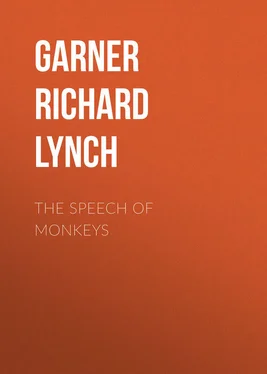Richard Garner - The Speech of Monkeys
Здесь есть возможность читать онлайн «Richard Garner - The Speech of Monkeys» — ознакомительный отрывок электронной книги совершенно бесплатно, а после прочтения отрывка купить полную версию. В некоторых случаях можно слушать аудио, скачать через торрент в формате fb2 и присутствует краткое содержание. Жанр: Природа и животные, foreign_antique, foreign_prose, на английском языке. Описание произведения, (предисловие) а так же отзывы посетителей доступны на портале библиотеки ЛибКат.
- Название:The Speech of Monkeys
- Автор:
- Жанр:
- Год:неизвестен
- ISBN:нет данных
- Рейтинг книги:4 / 5. Голосов: 1
-
Избранное:Добавить в избранное
- Отзывы:
-
Ваша оценка:
- 80
- 1
- 2
- 3
- 4
- 5
The Speech of Monkeys: краткое содержание, описание и аннотация
Предлагаем к чтению аннотацию, описание, краткое содержание или предисловие (зависит от того, что написал сам автор книги «The Speech of Monkeys»). Если вы не нашли необходимую информацию о книге — напишите в комментариях, мы постараемся отыскать её.
The Speech of Monkeys — читать онлайн ознакомительный отрывок
Ниже представлен текст книги, разбитый по страницам. Система сохранения места последней прочитанной страницы, позволяет с удобством читать онлайн бесплатно книгу «The Speech of Monkeys», без необходимости каждый раз заново искать на чём Вы остановились. Поставьте закладку, и сможете в любой момент перейти на страницу, на которой закончили чтение.
Интервал:
Закладка:
The most remarkable case which has come under my observation is one in which a young white-face has acquired the sound which means food in the Capuchin tongue. This event occurred under my own eyes. I regard this matter as so noteworthy and attended by such conditions as to show that the monkey had a motive in learning the sound, that I shall relate the case in detail.
THE WHITE-FACED CEBUSIn the room where the monkeys were kept by a dealer in Washington, there was a cage which contained a young white-faced Cebus of rather more than average intelligence. He was a quiet, sedate, and thoughtful little monk, whose grey hair and beard gave him quite a venerable aspect, and for this reason I called him Darwin. From some cause unknown to me he was afraid of me, and I showed him but little attention. On the same shelf and in an adjacent cage lived the little Capuchin, Puck. The cages were only separated by an open wire partition, through which they could easily see and hear each other. For some weeks I visited Puck almost daily, and in response to his sound for food I always supplied him with some nuts, banana, or other food. I never gave him any of these things to eat unless he would ask me for them in his own speech. On one of my visits my attention was attracted by little Darwin, who was uttering a strange sound which I had never before heard one of his species utter. I did not recognise the sound at first, but very soon discovered that it was intended to imitate the sound of the Capuchin, in response to which I always gave Puck some nice morsel of food. Darwin had undoubtedly observed that this sound made by Puck was always rewarded with something good to eat, and his evident motive was to secure a like reward. After this I always gave him some food in acknowledgment of his efforts, and I observed from day to day that he improved in making this sound, until at last it could scarcely be detected from the sound made by Puck. This was accomplished within a period of less than six weeks from my first visit. In this case, at least, I have seen one step taken by a monkey in learning the tongue of another. This was most interesting to me in view of the fact that I had long believed, and had announced as my belief, that no monkey ever acquired the sounds made by another species, or, indeed, ever tried to do so. I admit, however, that this one instance alone is sufficient to cause me to recede from a conclusion thus rendered untenable, and the short time in which this one feat was accomplished would indicate that the difficulty was not so great as I had regarded it. SPEECH USUALLY LIMITED I still regard it as a rule, however, that monkeys do not learn each other's speech, but the rule is not without exceptions. I have observed, and called attention to the fact, that when two monkeys of different species are caged together, that each one will learn to understand the speech of the other, but does not try to speak it as a rule. When he replies at all, it is always in his own vernacular. I wish to impress the fact, that monkeys do not generally carry on a connected conversation. Their speech is usually limited to a single sound or remark, which is replied to in the same manner; and to suppose that their conversations are elaborate or of a highly social character, is to go beyond the bounds of reason. This is the respect in which the masses fail to understand the real nature of the speech of monkeys or other animals.
CHAPTER V
Five little Brown Cousins: Mickie, Nemo, Dodo, Nigger, and McGinty – Nemo apologises to Dodo.
During the past winter there lived in Central Park a bright, fine, little monkey by the name of Mickie. He did not belong to the Park, but was merely kept as a guest of the city during the absence of his master in Europe. Mickie is a well-built, robust, good-natured monkey of the Capuchin variety. He does not talk much except when he wants food or drink, but he and I are the best of friends, and I frequently go into his cage to have a romp with him and his four little cousins.
When I first began to visit the Park in the fall of 1891, Mickie showed a disposition to cultivate my acquaintance, and as it ripened into a friendship day by day, we found great pleasure in each other's society. As the monkey-house was open to the public at nine o'clock in the morning, I had to make my calls at sunrise or thereabouts, in order to avoid the visitors who daily throng this building.
NEMO AND MICKIEIn this cage was kept another little boarder of the same species, which belonged to Mr. G. Hilton Scribner, of Yonkers. The keeper did not know the name or anything of the past history of this little stranger, and for want of some identity and a name I called him Nemo. He was a timid, taciturn little fellow, quite intelligent, and possessed of an amount of diplomacy equal to that of some human beings. He was the smallest monkey in the cage, on which account he was somewhat shy of the others. He was thoughtful, peaceable, but full of "guile." He sought on all occasions to keep on the best terms with Mickie, to whom he would toady like a sycophant. He would put his little arms about Mickie's neck and hang on to him in the most affectionate manner. He would follow him like a shadow, and stay by him like a last hope. If anything ever aroused the temper of Mickie it was sure to make Nemo mad too; if Mickie was diverted and would laugh, Nemo would laugh also if he was suffering with a toothache. He was as completely under the control of Mickie as the curl in Mickie's tail. When I first began to visit them Nemo would see Mickie bite my fingers while we were playing, and he supposed it was done in anger. Nemo never lost a chance to bite my fingers, which he would always do with all his might, but his little teeth were not strong enough to hurt me very much. He would only do this after seeing Mickie bite me, and he did not evince any anger in the act, but appeared to do so merely as a duty. He would sneak up to my hands and bite me unawares; then he would run to Mickie and put his arm about his neck just as you have seen some boys do when trying to curry favour with a larger boy. On one occasion while in the cage with them he slipped up to me and bit my finger, for which I kindly boxed his little ears. I would then give Mickie my finger and allow him to bite it, after doing which I slapped him gently and then give it to him again. I would then allow Nemo to bite my finger, and if he bit it too hard I would slap him again, and in this manner soon taught him to understand that Mickie only bit me in fun, and he evidently learned that this was a fact. He did not appear, however, to catch the point clearly or see any reason therefor, but on all occasions thereafter he would take my finger in his mouth and hold it in his teeth, which were scarcely closed upon it. This he would do for a minute at a time without having the least apparent motive except that he had seen Mickie do so. MICKIE'S ATTACHMENT Often while holding my finger in this manner, with a look of seriousness worthy of a supreme judge, he would roll his little eyes at me in the most inquiring manner, as if to say "how is that"? When he once realised that Mickie was so much attached to me, Nemo always showed a desire to be on friendly terms with me; and when I would go into the cage to play with Mickie and McGinty, he always wanted to be counted in the game. When I had anything for them to eat he always wanted a seat of honour at the table, and he would at times want to fight for me when the other monkeys got too friendly. Poor little fellow, he is now dead, but the image of his cute little face and original character are deeply imprinted on my mind. I was never able to secure a record of the sounds of his little voice, though I have often heard him talk. He had a soft musical voice, and great power of facial expression.
APOLOGY TO DODOOne of the most remarkable things I have ever observed among monkeys was done by this little fellow. On two separate occasions I have seen him apologise to Dodo in the most humble manner for something he had done, and I tried very hard to secure a record of this particular speech, in which I totally failed, as I could not foreknow when such an act would be done, and therefore could not have my phonograph in place to obtain such a record. I called the attention of Mr. F. S. Church, the eminent artist, to this act, with the hope that he might be able to make a sketch of Nemo while in this attitude. I do not know what the offence was, but the pose and expression as well as the speech were very impressive. He sat in a crouching position, with the left hand clasping the right wrist, and delivered his speech in a most energetic but humble manner. The expression on his face could not be misunderstood. After a few moments he paused briefly, and then seemed to repeat the same thing some two or three times. The manner of his delivery was very suggestive, and his demeanour was conciliatory. When he had quite finished his speech, Dodo, to whom the apology was being made, and who had listened to it in perfect silence, delivered a sound blow with her right hand on the left side of the face of the little penitent, to which he responded with a soft cry, while Dodo turned and left him without further debate. I also called the attention of the keeper to this act, and he assured me that he had repeatedly witnessed the same. What the subject of his speech was or the cause which brought it about I am not able to say, nor can I say with certainty to what extent he explained, but that it was an apology, or explanation of some kind at least, I have not the slightest doubt. I do not believe, of course, that his speech contained any details concerning the offence, but that it expressed regret, penitence, or submission does not to my mind admit of a doubt. I have seen a few other cases somewhat similar to this, but none of them comparing in point of polish and pathos to that of Nemo in his unique little speech.
Читать дальшеИнтервал:
Закладка:
Похожие книги на «The Speech of Monkeys»
Представляем Вашему вниманию похожие книги на «The Speech of Monkeys» списком для выбора. Мы отобрали схожую по названию и смыслу литературу в надежде предоставить читателям больше вариантов отыскать новые, интересные, ещё непрочитанные произведения.
Обсуждение, отзывы о книге «The Speech of Monkeys» и просто собственные мнения читателей. Оставьте ваши комментарии, напишите, что Вы думаете о произведении, его смысле или главных героях. Укажите что конкретно понравилось, а что нет, и почему Вы так считаете.












